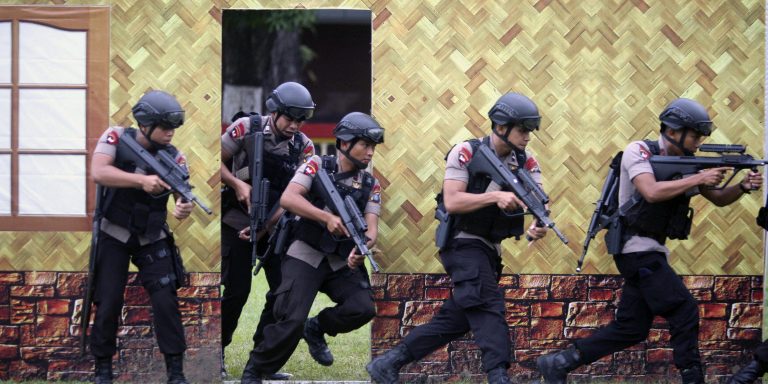INTELBRIEF
June 6, 2018
IntelBrief: Indonesia Tries to Adapt Laws for New Terror Threats

- Late last month, Indonesia’s parliament approved significant new changes to the country’s counterterrorism laws after the country experienced several terror attacks.
- The new laws, approved unanimously and representing a large shift from the previous decades, allow for the military to be involved in police counterterrorism operations.
- Details as to how the military, which had been limited to national defense, will work with the police have yet to be publicly discussed.
- The laws also permit the government to hold suspects for nearly 11 months without trial and 21 days without a formal charge.
.
Indonesia is far from alone in struggling to adapt counterterrorism laws to fit a democracy. Proposed changes to its laws had been stuck in parliament since just after the January 2016 terrorist attack in Jakarta, in which four people and they attackers were killed and more than 20 injured by guns and explosives. The May 13 and 14 suicide bombings carried out by two families horrified the country and provided the impetus for the new changes to finally be voted on and unanimously approved.
The changes include lengthening the time that officials can hold someone without formal charges to 21 days and up to nearly 11 months total without trial. Formulating the correct balance between rights and security is a complicated issue—one with which governments often struggle. Investigators have to comb through data quickly, even when it has an international angle, be it propaganda that inspired the attacks, or actual foreign actors operating inside the country. The new law seeks to provide investigators with extra time to do their jobs without wholesale adoptions of indefinite detentions.
The laws also expand the definition of terrorism to include not just ideology but politics and the intention to disrupt security. They allow prosecutors to look into propagandists and clerics espousing violence and encouraging Indonesians to travel abroad to work with groups such as the so-called Islamic State. The Islamic State has made establishing a foothold in Indonesia a priority.
The most controversial change is that police are now permitted to request the direct involvement of the military in these cases. This is a justifiably sensitive topic in any democracy but especially in Indonesia, which saw decades of military abuses under the dictatorship of Muhammad Suharto. Suharto was ousted from office in 1998 and the military has been restrained to national defense since then. The government has yet to provide details as to how the military will be used.
Indonesia is no stranger to terrorism and has a well-regarded counterterrorism unit that falls under the authority of the national police. Densus 88 (Detachment 88) was formed in 2003 after the devastating 2002 Bali nightclub bombings. It is a quasi-military unit but accountable to the civilian police force, and likely the military assistance the new laws provide for means the military will help Densus 88 in raids, especially in remote locations or situations where the expected armed resistance will be significant.
Given the atrocities under Suharto, Indonesia will need to walk a difficult balance to address a very real threat while not augmenting the problem or trampling on the freedoms the laws and police actions are meant to protect.
.
For tailored research and analysis, please contact: info@thesoufancenter.org
[video width="960" height="540" mp4="https://thesoufancenter.org/wp-content/uploads/2018/06/Final-Edit-1-209.mp4" poster="https://thesoufancenter.org/wp-content/uploads/2018/06/AP_16356490210650-e1528200271541.jpg"][/video]